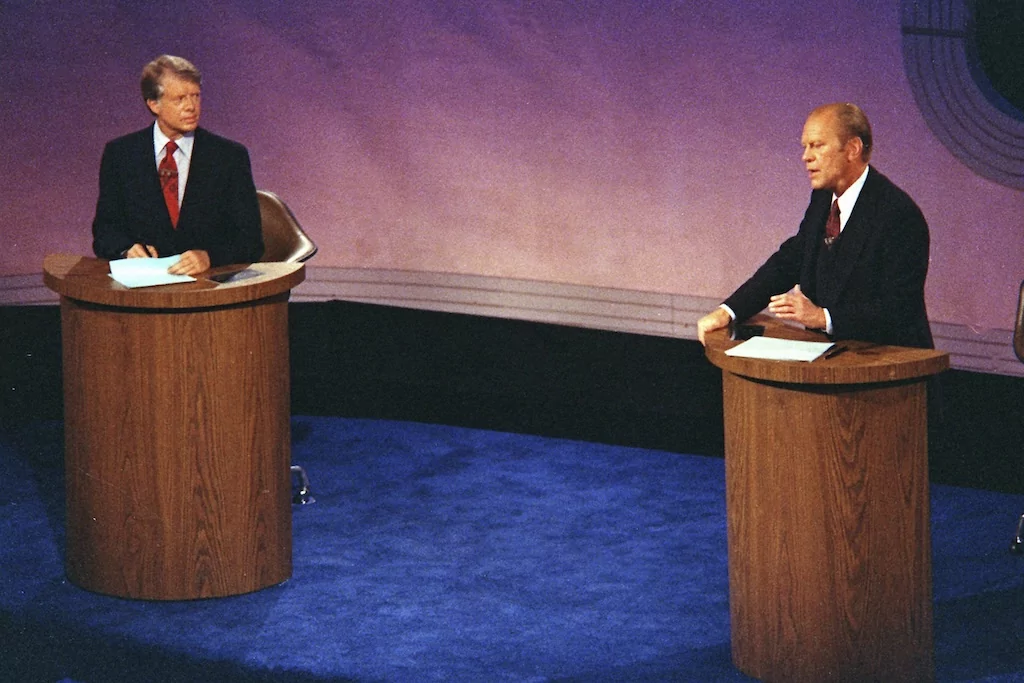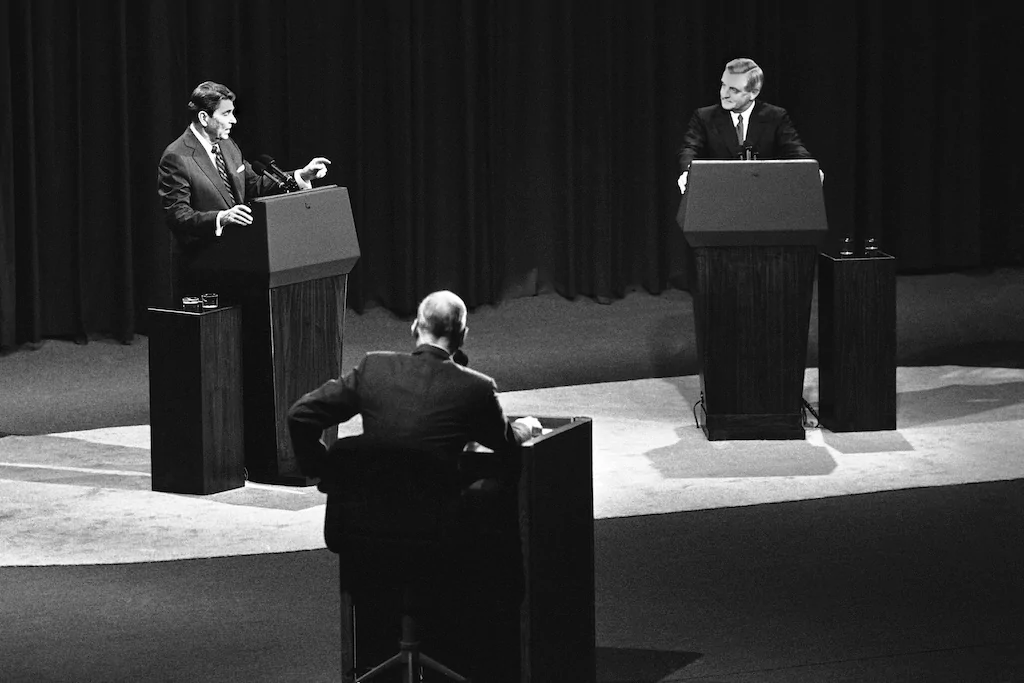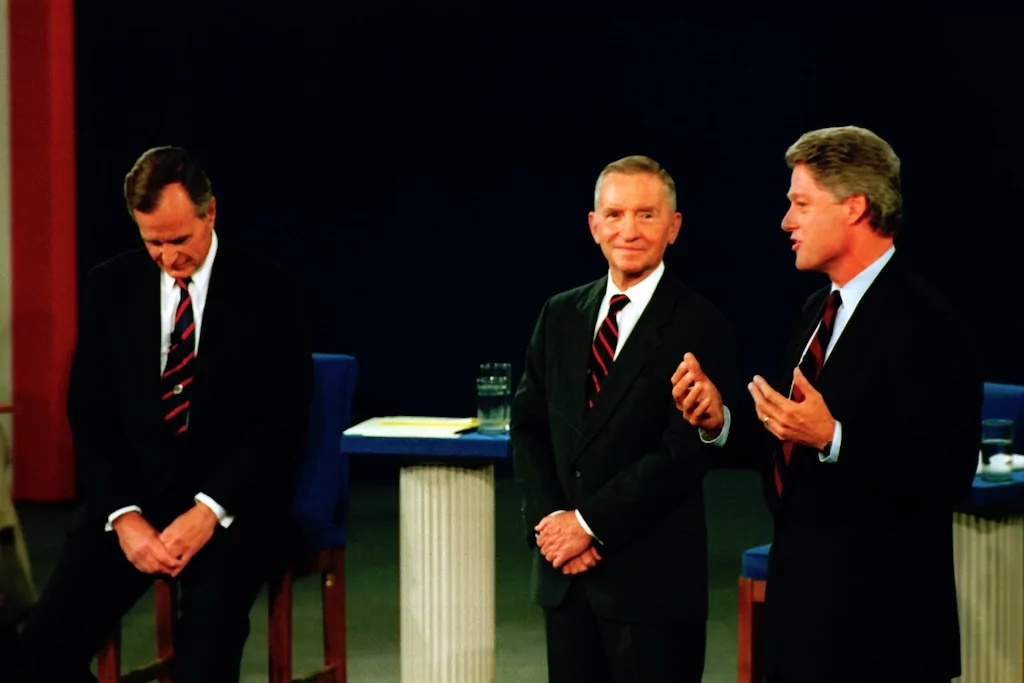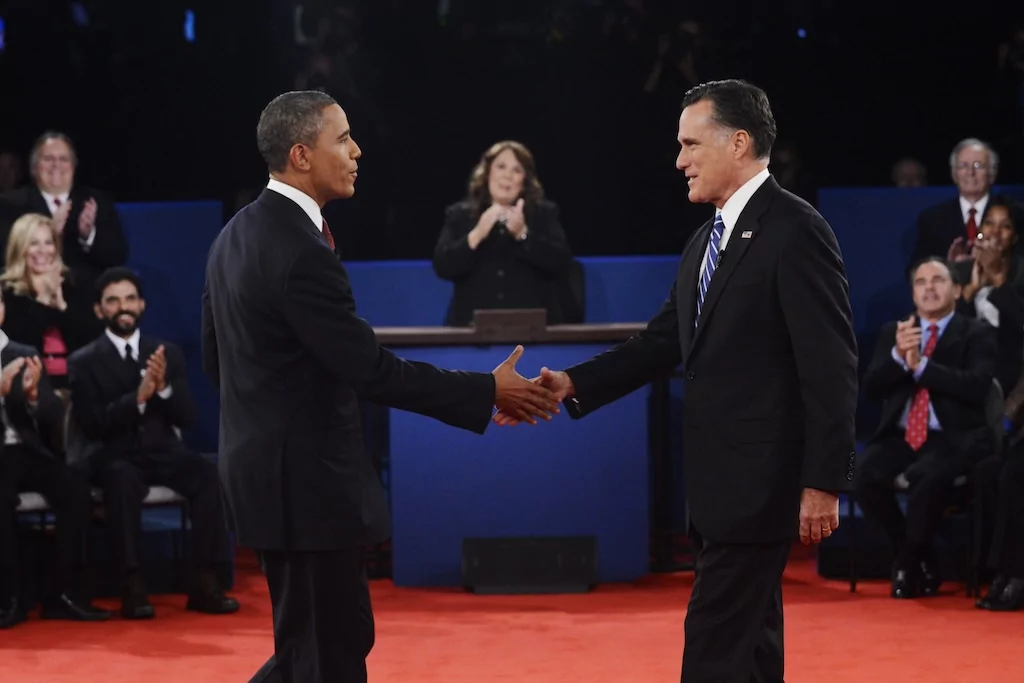
President Joe Biden and former President Donald Trump are slated to square off in a debate on Thursday, which could include a standout moment for one of the men if history repeats itself.
Since the first televised presidential debate in 1960, the bright lights of a national viewing audience have seen some candidates rise and others fall. Here are some of the most memorable moments from presidential debates over the years.
1976 – Gerald Ford ‘eastern Europe’ gaffe
As then-President Gerald Ford was seeking to win a full term in the White House, after being thrust to the Oval Office through a pair of resignations, one of the most memorable moments in his ultimately unsuccessful presidential campaign came during a debate with then-former Democratic Georgia Gov. Jimmy Carter.
While discussing foreign policy, Ford declared that there was “no Soviet domination of Eastern Europe” — even as the Soviet Union held significant influence over the region at the time through the Warsaw Pact. The Helsinki Accords signed the previous year were criticized by some as having solidified the post-World War II borders and the Soviet’s “iron curtain” over eastern Europe, but Ford rejected the notion that the Soviets dominated that part of the continent.
“Now, what has been accomplished by the Helsinki agreement? Number one, we have an agreement where they notify us and we notify them of any military maneuvers that are to be undertaken. They have done it in both cases where they’ve done so. There is no Soviet domination of Eastern Europe and there never will be under a Ford administration,” Ford said.
Debate moderator Max Frankel followed up by questioning Ford on if he believed the “Russians are not using Eastern Europe as their own sphere of influence in occupying most of the countries there and making sure with their troops that it’s a Communist zone.” Ford doubled down by contending he did not believe the Yugoslavs, Romanians, or Poles would consider themselves under Soviet domination.
“Each of those countries is independent, autonomous; it has its own territorial integrity. And the United States does not concede that those countries are under the domination of the Soviet Union,” Ford said, “As a matter of fact, I visited Poland, Yugoslavia and Romania to make certain that the people of those countries understood that the President of the United States and the people of the United States are dedicated to their independence, their autonomy and their freedom.”

Ford’s read on the situation in eastern Europe with the Soviets, specifically with regard to naming Poland as a country he did believe was under their domination, was panned and he attempted to clarify after the debate that he meant they do not believe they will be “forever dominated—if they are—by the Soviet Union.”
Carter slammed Ford’s remarks, arguing it was “ridiculous” for Ford to have made that assertion during the debate.
“For anyone to state that the people of Hungary, Czechoslovakia, Rumania and East Germany are free of Soviet domination is ridiculous,” Carter said after the debate, according to the New York Times.
Ford would go on to lose the election to Carter in the general election, but four years later Carter would see a memorable debate moment work against him.
1980 – Ronald Reagan’s “there you go again”
Former Republican California Gov. Ronald Reagan failed to win the GOP nomination in 1976, but in 1980 the former movie star made it to the general election against then-President Carter. During the only debate between the two, Reagan used one now-famous line to defuse an attack from the Democratic nominee.
Carter went after Reagan for his previous stances on Social Security and Medicare, accusing the former governor of beginning “his political career campaigning around this nation against Medicare.” Reagan’s response began with the most memorable line of the debate.
“There you go again,” Reagan said, eliciting laughter from the crowd.
The line would become the iconic moment of the debate, lending to the lore of Reagan’s nickname: the great communicator.
Reagan would win the election against Carter in a landslide, winning 44 states in the lopsided result.
1984 – Ronald Reagan’s age rebuttal
Then-President Reagan entered the second debate against former Democratic Vice President Walter Mondale bruised after their first meeting. During their first debate, Reagan, 73, had gaffes and appeared confused at times – bringing up questions about his age as a potential vulnerability in his bid for a second term.
Debate moderator Henry Trewhitt asked Reagan about the age concerns, saying how it had been “lurking out there for 2 or 3 weeks.”

“You already are the oldest president in history. And some of your staff say you were tired after your most recent encounter with Mr. Mondale. I recall yet that President Kennedy had to go for days on end with very little sleep during the Cuban missile crisis. Is there any doubt in your mind that you would be able to function in such circumstances?” Trewhitt asked Reagan.
“Not at all, Mr. Trewhitt, and I want you to know that also I will not make age an issue of this campaign. I am not going to exploit, for political purposes, my opponent’s youth and inexperience,” Reagan replied.
Reagan’s witty response garnered laughter from the audience and Mondale, 56, and the president was widely viewed as having won the debate. When recounting the second debate in an interview with PBS in 1990, Mondale remarked “I walked off and I was almost certain the campaign was over, and it was.”
Reagan won in a larger landslide than his 1980 victory, winning everywhere except in Washington, D.C., and Minnesota.
1992 – Bush’s untimely gesture
Then-President George H.W. Bush faced two challengers in the 1992 general election – independent businessman Ross Perot and Democratic then-Arkansas Gov. Bill Clinton. In debates, small actions can have disproportionate reactions, as Bush would learn.
During the second debate between the trio, Bush appeared to check his watch multiple times in the town hall-style forum. The small actions by Bush were believed to have hurt him, as appearing disinterested in the debate.
Bush would later be asked about his actions, in a 1999 interview with PBS, where he said he was not “too conscious of it at all.”

“Oh God, do I remember. I took a huge hit. That’s another thing I don’t like debates, you look at your watch and they say that he hasn’t any business running for president. He’s bored and he’s out of this thing, he’s not with it and we need change,” Bush told PBS.
“They took a little incident like that to show that I was, you know, out of it. They made a huge thing out of that. Now, was I glad when the damn thing was over? Yeah, and maybe that’s why I was looking at it, only 10 more minutes of this crap,” he added, continuing a discussion on how he disliked the presidential debates.
Bush would lose reelection to Clinton, while Perot would not win any states but did significantly cut into Bush’s vote totals.
2000 – Gore’s lockbox talk and sighing
During the first presidential debate in 2000, then-Vice President Al Gore walked in leading then-Republican Texas Gov. George W. Bush but he left the debate in worse standing.
Gore did not have any obvious flubs during the debate which hurt him, but his constant sighs and rolling of eyes while Bush was answering questions and his overuse of the term “lockbox” to discuss how he would protect Medicare, became satirized and hurt him.
During the first question of the debate, Gore proclaimed that he would “put Medicare and Social Security in a lockbox and protect them.” The line had been one Gore had touted, but he would repeat phrase six additional times throughout the debate.
Gore’s performance was mocked on NBC’s Saturday Night Live that week, with the then-vice president, played by Darrell Hammond, constantly using “lockbox” and overdramatically reacting to the Bush character’s answers.
Bush would go on to win the election against Gore, in a tight race that came down to Florida.
2012 – Romney gets incorrectly fact-checked
Debate moderators typically stay out of the conversation between candidates, but in 2012 CNN’s Candy Crowley fact-checked former Republican Massachusetts Gov. Mitt Romney on a statement he had made about then-President Barack Obama and Benghazi – only the fact check was incorrect.
The exchange began with Obama proclaiming that he had called the Benghazi terrorist attack an act of terror in the immediate aftermath, but Romney claimed the then-president had not.

“The day after the attack, Governor, I stood in the Rose Garden, and I told the American people and the world that we are going to find out exactly what happened, that this was an act of terror. And I also said that we’re going to hunt down those who committed this crime,” Obama said, in part.
“I want to make sure we get that for the record, because it took the president 14 days before he called the attack in Benghazi an act of terror,” Romney said in his response to Obama, with Obama interrupting to say “get the transcript.”
Crowley then interrupted to say that “he did call it an act of terror.”
Obama White House officials did not directly refer to the attack as an act of terror until two weeks later. Obama’s Rose Garden remarks a day after the attack did say “no acts of terror will ever shake the resolve of this great nation, alter that character, or eclipse the light of the values that we stand for,” but he did not directly refer to the incident as an act of terror.
Crowley told CNN after the debate that Romney was actually correct and that “he was right in the main, I just think he picked the wrong word.”
Obama would go on to win a second term in the White House that November, defeating Romney.
2016 – Trump’s responses to Clinton
Republican nominee Donald Trump was the underdog in the 2016 presidential election against former Secretary of State Hillary Clinton, but some memorable moments from the debates helped boost the businessman to the White House.
One of the most memorable moments between Trump and Clinton from the trio of debates came in the second matchup. Clinton remarked that she was glad someone like Trump was not in charge of the law in the country, leading Trump to land a famous one-liner.
“It’s just awfully good that someone with the temperament of Donald Trump is not in charge of the law in our country,” Clinton said.
“Because you’d be in jail,” Trump replied.
During the third debate, Trump’s use of the word “wrong” to push back on Clinton’s claim sparked memes and landed the businessman a memorable moment voters could remember.
Trump would upset Clinton in the 2016 election weeks later, but would lose to Biden in the 2020 election. Eight years after the 2016 campaign, Trump is seeking a second term in a rematch against Biden.
CLICK HERE TO READ MORE FROM THE WASHINGTON EXAMINER
The first presidential debate of the 2024 cycle between Biden and Trump will begin at 9 p.m. EDT from Atlanta, Georgia, and will air on CNN along with various other networks and cable channels.
Biden and Trump have agreed to a second presidential debate in September, which will be hosted by ABC News. Both debates mark some of the earliest in modern history.






